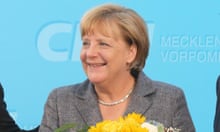Refugees moving to Germany may in future have to give police permission to search their social media accounts for suspicious posts, the interior minister has announced.
Presenting a raft of anti-terror measures at a press conference on Thursday, Thomas de Maizière announced that border police would pilot a scheme whereby refugees resettled in Germany under the deal between Turkey and the EU would have to hand over their smartphones for security checks if they did not have passports.
“If you want to come to Germany, we have to make safety checks on you. And to make safety checks, we will ask you to show us your Facebook contacts from the last few months, which are public in principle anyway,” he said. However, De Maizière admitted that it remained to be seen whether the time and cost would justify the effort.
The scheme points to a growing frustration with traditional means of establishing a person’s identity at border crossings. “We frequently encounter cases where refugees often don’t carry identity documents, but do nearly all carry their smartphones,” the minister said.
The system whereby refugees are fingerprinted upon registering in the EU has also proven fallible, De Maizière said. In the case of the 16-year-old who attacked a group of people on a train near Würzburg, a fingerprint had been taken, but it could not be matched with the Europe-wide Eurodac database.
Smartphones, by contrast, are valuable tools for many refugees, allowing them to stay in touch with friends and relatives, and gather potentially lifesaving information.
Earlier this week, German police arrested a Syrian asylum seeker suspected of planning to carry out an attack at the start of the Bundesliga football season. According to Südwestrundfunk radio channel, photos showing fighting in Syria had been found on the suspect’s phone and computer, although it was unclear whether he had taken them himself.
Authorities in Denmark, Norway, Sweden and the Netherlands routinely take and examine mobile phones to help establish a refugee’s identity if they have no formal documents with them when they enter the country.
Danish immigration law authorises officials to temporarily confiscate phones if the devices are “presumed to be of importance in establishing a foreigner’s identity”. The provision predates a raft of tougher immigration controls introduced in Denmark earlier this year, including one that allows police to seize migrants’ cash and some valuables to help pay for their accommodation.
Speaking to Politiken newspaper, Richard Osterlund la Cour, a police spokesman, said: “If you come to the country and say you are from Syria, but have nothing but your face to prove it, your mobile phone is the best way to determine if you are telling the truth.”
The Danish practice made headlines earlier this year when a Politiken investigation revealed that immigration officers had confiscated the mobile phones of 55 unaccompanied migrant children, with many having to wait up to a month for them to be returned.
The pilot scheme is one of a number of anti-terror measures that De Maizière proposed after a spate of violent attacks in southern Germany at the start of August, which have raised security fears in the country.
Other measures include increasing the number of police and surveillance staff, speeding up the deportation of foreign criminals and revoking German citizenship from dual nationals if they have been found fighting for militant groups abroad. De Maizière said he would explore ways of using recognition software for surveillance in public spaces and discuss ways in which to make it easier for doctors to tip off authorities about potential terror risks.
The minister crucially distanced himself from calls to ban the full face veil for women and abolish dual citizenship. The proposals are thought to be part of a 27-point Berlin declaration set to be presented to the public on 18 August by Christian Democrat state interior ministers, some of whom are holding regional elections next month.
De Maizière insisted the declaration, details of which were leaked to the press on Wednesday, had been merely a draft and he considered some of the more controversial measures to be problematic. “You cannot ban everything that you disapprove of. And I disapprove of the wearing of the burqa,” he said.
A report produced by the Bundestag’s scientific service, and circulated among German MPs, points out than a move to ban the full-face veil would most likely be incompatible with the German constitution and likely to be rejected by the constitutional court.








